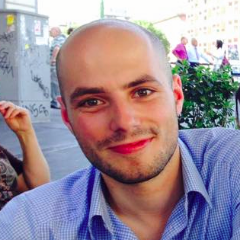One superstar soprano can be all it takes to transform the fortunes of an opera production. Anna Netrebko had not performed La traviata since stepping into Sir Richard Eyre's staging for the Royal Opera on tour in Japan in 2010. Now she was back as Violetta, in La Scala's revival of Liliana Cavani's sumptuous but moth-eaten 1990 production.
Perhaps the opera house had foreseen the need for a sprinkling of stardust. An evident diary clash had prevented Netrebko from performing in the opening half of the run; La Scala's unconventional solution was to draft in rising soprano Ailyn Pérez for the first performances, who sang the role beautifully if without Netrebko-sized charisma. Regardless, the official opening performance last month had been on the whole a pretty lacklustre affair. It took the arrival of Netrebko, for what felt like the de facto opening night, to lift music-making to another plane.
Netrebko's Violetta is now fuller in body and voice than in her former incarnation. Goodbye to the fresh-faced damsel of Willy Decker's 2005 Salzburg production; hello to a larger-than-life courtesan in her twilight years, after too many years of hedonism have caught up with her. Netrebko is too intelligent an artist to have attempted to bend her musical personality to meet our common expectations of the role. Instead, she appropriates Violetta's music for her own artistic means, and transforms the way we conceive of one of opera's most familiar characters.
What remains is the high drama with which the soprano charts Violetta's personal journey. The contrast between infatuation and defiant individualism in “Ah, fors' è lui... Sempre libera” was vivid. Cornered by Giorgio Germont in Act 2, she resembled a caged and ferocious animal. In the finale, where she interspersed flickering top notes with violent coughs (entirely appropriately in this no holds-barred performance), Netrebko tore about the stage with feral abandon, a force of nature desperately clutching at her last strains of life.
Has Netrebko's voice grown too large for Violetta? Certainly many of the qualities she now possesses – purring richness, ample horsepower and a capacious bottom register – place her outside the coloratura soprano category. Yet in harnessing the heft that made her screams of “gioia” so exhilarating she has forfeited none of her control, poise or sparkling runs. And her Italian, far from the muffled collection of indistinct vowels we have sometimes heard, was distinctive for its clarity.
The new is mixed with the unashamedly old. Liliana Cavani's production must have looked superannuated when it came out nearly 30 years ago. The cinema director, best known for her film The Night Porter, produced a period vision of Parisian high society replete with lavish ball gowns, chaise longues and billiard tables – conservative to the modern eye, but stylishly realised. Cavani's craft is most evident in the Act I, where minute detail renders her mise-en-scène a hive of activity: lovers liaise, gawkers lurk and one tipsy attendant swoons in the heat of the moment. But in Acts 2 and 3, where Cavani takes a more passive approach to embellishing her hulking sets, a skilled cast is needed to provide something to grab hold of.
Thankfully, this production has one. Francesco Meli is not the most complex Alfredo we have ever seen, but the tenor has acquired some acting skills since his recent appearance in La Scala's Don Carlo (fidgeting hands belie butterflies as he first prepares to approach Violetta) and the singing, though two-dimensional in inhabiting the two extremes of full-throttle and off-the-voice vocalisation, is at least exciting. Leo Nucci displays ageless artistry in his stony Giorgio Germont, albeit one where humanity flickers beneath an impassive exterior. The voice remains in fine, burnished form, best demonstrated in a stonking “Di Provenza il mar”. “Bella voi siete e giovine” consisted in a triangle of hair-raising magnetism between the baritone, Netrebko and the pit.
Rivalling Netrebko for a gushing audience reception was 85-year-old conductor Nello Santi, who leads what is only his second production at this house (his last appearance was in 1971!). The criticism to which Santi's snail-paced tempi have been subjected filtered into the auditorium itself: “I tempi maestri” reminded one voice from the gods, before the offender was promptly silenced by fellow audience members in a hail of hisses and insults. You saw his point, though, when gelatinous playing placed such noticeable demands on singers struggling for air.
Yet Santi's approach caused energy to ratchet as with a wind-up toy, so that successive passages flew when released with a flick of his baton. This was a characterful, pulpy and explosive performance from the pit (though modestly so, in line with conductor's humble manner). The La Scala chorus once again proved itself a covetable asset. A fine performance all round.




